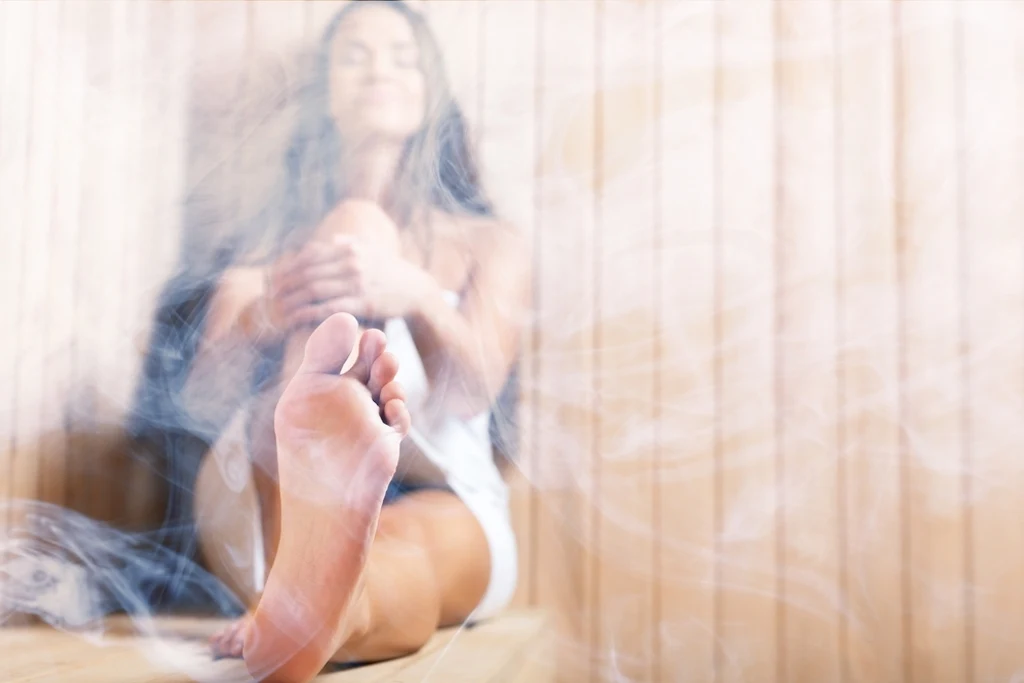Is Sweating It Out In A Sauna Good For You?

April 8, 2019 - Updated October 25, 2022

If you’ve been following us for a while, you know that we love to Sweat! While many of us break into a Sweat when we’re training, did you know you can also work up a sweat and raise your heart ratewhile relaxing? Yes, we’re talking about saunas!
If you just like it hot or are looking for a way to reduce muscle soreness, you might be wondering what the benefits of a sauna are. Read on to learn more about the health benefits and risks involved in getting steamy!
What is a sauna?
A sauna is a closed, heated room that encourages you to sweat by increasing your body temperature. Traditional saunas use dry heat to raise the temperature of the room, which can be done slightly differently, depending on the type of sauna.
The most common types of saunas are:
Electric or gas saunas— An electric or gas heater is used to warm the temperature to high heat with low humidity (generally somewhere between 5-20% humidity).
Wood sauna — A wood burner heats the sauna, delivering a high temperature with low humidity.
Infrared sauna — Infrared saunas rely on lamps to heat the body, rather than heating the whole sauna.
Mayo Clinic describes saunas as a form of passive heat therapy, and points to emerging evidence that suggests in addition to using a sauna to relax, they may promote numerous health benefits.
What's the difference between a sauna and a steam room?
The main difference comes down to the way they are heated. Traditional saunas use dry heat to induce heat within the body and are typically heated by gas, electric or infrared technology. Meanwhile, steam rooms use boiling water to create steam, which is then trapped inside the room, creating a humid environment.
Humidity levels aren’t the only difference though. When it comes to temperatures, saunas are typically much higher, reaching between 70-100℃ (158-212℉). These high temperatures are why you shouldn’t stay in a sauna for too long (Harvard Medical School recommends you don’t go over 20 minutes!).
The health benefits of a sauna
Saunas may promote cardiovascular health
A systematic review published in 2018 pointed to considerable evidence that suggests intense, short-term heat exposure elevates skin and core body temperatures, in turn leading to well-documented cardiovascular effects such as increased heart rate, blood flow, cardiac output and sweating.
The review highlighted that half of the studies they included involved populations with active (or an increased risk of) cardiovascular disease and all demonstrated beneficial health effects. Another study found that infrared sauna baths are associated with a short-term improvement in cardiac function, but cautioned that more research is needed into the long-term effects.

Saunas may improve circulation
You’ll find your circulation is boosted when you’re in the sauna, due to an increased heart rate. According to Harvard Health, the heart nearly doubles the amount of blood it pumps each minute due to an increased pulse rate of 30% or more. Most of that extra blood flow is directed towards the skin (more on that, later!).
Saunas may help to reduce pain
Studies have suggested that sauna usage can have a positive impact on pain levels. A 2019 study of patients with lower back pain found that dry sauna therapy can help to improve quality of life and reduce pain, while another study from 2018 suggested Finnish-style or infrared saunas could benefit patients with pain syndromes and rheumatic diseases such as fibromyalgia and rheumatoid arthritis.
Saunas may improve skin health
That added boost to your circulation can have a positive impact on your skin. After all, it is your body’s largest organ! Mayo Clinic highlights how saunas can encourage healthy skin due to the protective effect on physiology, evidenced by the stability of the epidermal barrier function, increased hydration of the outer layer and faster recovery of water loss.
However, people with skin conditions such as rosacea or dermatitis may find saunas aggravate their skin.
Saunas may reduce muscle soreness
Saunas are often included in post-workout recovery routines because it’s believed they can help alleviate muscle soreness. However, much of the research in this space has focused solely on the benefits on male recovery.
A 2015 study on infrared saunas examined the recovery efforts of 10 male athletes, finding that sauna bathing encourages the neuromuscular system to recover from maximum endurance performance.
A recent 2021 study (of which 38.6% of participants were female) recognised the popularity of saunas as a recovery method among athletes, highlighting how 96.7% of participants used saunas as part of their post-workout recovery plans. While this study didn’t look specifically at muscle soreness, it suggested there is no conclusive evidence about the effectiveness of saunas as a recovery method, suggesting massage, compression garments, sleep and cold water immersion were more effective.
But if you enjoy saunas as a feel-good way to practice self-care or they make your body feel amazing, we can’t argue with that!
Saunas may be a great way to relax
For many of us, saunas are a great way to switch off, unwind and relax thanks to the heat and lack of distraction. Studies have even suggested that saunas can help reduce stress in those with high-stress jobs.

Don't forget to take precautions
While saunas offer many benefits, there are some risks and disadvantages to be mindful of. Dehydration and dizziness pose the biggest risk, which is why it’s so important to make sure you’re well-hydrated before you start to sweat it out.
If you experience respiratory problems such as asthma or allergies, a sauna may dry out your respiratory tract, so check with a healthcare professional before using one. People with heart conditions or high blood pressure are also advised to check in with a doctor before using a sauna.
There are some safety precautions to keep in mind:
Drink plenty of water before and after your sauna. Due to the amount of fluid you will sweat out, it's important to replace this where you can.
Avoid drinking alcohol or taking any medication that may impact sweating, hydration levels or cause you to overheat.
Don’t stay in too long, 15-20 minutes at a time is enough to enjoy dry sauna benefits.
Take the time to cool down gradually afterwards.
Avoid the sauna if you are feeling unwell to ensure you don’t overheat or become dehydrated.
While there is little research into sauna usage for pregnant women, the NHS advises pregnant women avoid saunas (in addition to jacuzzis, hot tubs and steam rooms) due to the risks of overheating, fainting and dehydration.
A sauna can be part of a healthy lifestyle
If spending time in the sauna makes you feel good and you haven’t been advised against using a sauna by your healthcare provider, reap the rewards! Getting Sweaty doesn’t always have to involve movement.

A more empowered you starts with Sweat, and our editorial team is here to bring you the latest fitness tips, trainer recommendations, wellbeing news, nutritional advice, nourishing recipes and free workouts.
* Disclaimer: This blog post is not intended to replace the advice of a medical professional. The above information should not be used to diagnose, treat, or prevent any disease or medical condition. Please consult your doctor before making any changes to your diet, sleep methods, daily activity, or fitness routine. Sweat assumes no responsibility for any personal injury or damage sustained by any recommendations, opinions, or advice given in this article.
Wellbeing